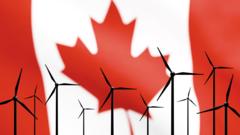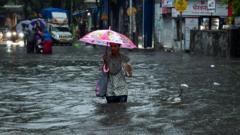Canada's 2025 federal election sees candidates vying for voter support with contrasting energy agendas while climate change fades in public concern.
**Canada's Election Focus Shifts to Energy Amid Climate Concerns Dwindling**

**Canada's Election Focus Shifts to Energy Amid Climate Concerns Dwindling**
As candidates prioritize fossil fuels over climate action, energy policies emerge as key electoral issues.
In the lead-up to Canada's 2025 federal election, the discourse surrounding climate change is being overshadowed by candidates' commitments to fossil fuels and energy production. The emphasis is particularly acute as concerns around U.S. President Donald Trump's policies dominate the political landscape. Candidates Mark Carney of the Liberals and Pierre Poilievre of the Conservatives are both advocating for expanded energy infrastructure as Canada looks to reduce its historical dependency on U.S. energy markets.
Mark Carney's Liberal platform is focused on elevating Canada to a global leader in both green and conventional energy sectors. In a notable departure from previous election cycles, Carney has unveiled plans to fast-track renewable energy initiatives while emphasizing the importance of traditional energy sources. This marks a significant shift from the 2021 election, where environmental concerns were paramount, culminating in the establishment of a net-zero emissions law.
Carney, who took over as leader earlier this year, previously held various influential roles dedicated to climate action, including at the Bank of England and as a UN Special Envoy. However, he began his term by repealing a pivotal consumer carbon tax, originally implemented to impose a fee on fossil fuel consumption. The tax's unpopularity and its association with the rising cost of living have been leveraged by the Conservatives, allowing Poilievre to criticize Carney's climate commitments by branding him "Carbon Tax Carney."
Environmental advocates express concern that Carney’s tax repeal signals a retreat from robust climate policies. Catherine Abreu, director of the International Climate Politics Hub, argues that this decision undermines the narrative on climate action and dismisses the economic benefits of a green transition. Despite echoing a commitment to green energy, Carney's campaign does not provide extensive details on achieving these ambitions.
Since late 2023, surveys indicate a decline in public concern for climate issues, with voters increasingly focused on rising living costs, reflecting a shift in priorities exacerbated by geopolitical influences such as ongoing conflicts in Ukraine. Mark Winfield, an environmental expert, suggests that Canada’s wealth in natural resources is garnering increased attention from international partners, further complicating climate discussions within the election narrative.
Meanwhile, Poilievre's Conservative campaign is firmly rooted in addressing economic pressures faced by Canadians, advocating for aggressive expansion in the oil and gas sector and the removal of industry carbon taxes. His rhetoric positions Canadian oil and gas as a cleaner alternative to coal, potentially appealing to voters despite opposition from environmentalists.
With the backdrop of various pressures—including historic wildfire seasons and rising economic challenges—both candidates are forced to navigate the delicate balance between energy production and climate commitments. As Canadian voters prepare for the polls on April 28, the interplay of energy policy and environmental responsibility remains a central but contentious theme in the electoral race.
On the environmental front, Yves-François Blanchet, leader of the Bloc Québécois, has been vocal in criticizing both leading candidates for neglecting climate change realities. He emphasizes the inconsistency between their energy policies and Canada's pledged commitments to reduce carbon emissions substantially by 2030. As of 2023, actual reductions are only a fraction of what was promised, presenting a significant challenge for the candidate who prevails in the election.
As the race unfolds, it is clear that the next Canadian leader will face crucial decisions regarding energy use that could redefine the nation’s role in both the global energy landscape and its climate strategies for years to come.
Mark Carney's Liberal platform is focused on elevating Canada to a global leader in both green and conventional energy sectors. In a notable departure from previous election cycles, Carney has unveiled plans to fast-track renewable energy initiatives while emphasizing the importance of traditional energy sources. This marks a significant shift from the 2021 election, where environmental concerns were paramount, culminating in the establishment of a net-zero emissions law.
Carney, who took over as leader earlier this year, previously held various influential roles dedicated to climate action, including at the Bank of England and as a UN Special Envoy. However, he began his term by repealing a pivotal consumer carbon tax, originally implemented to impose a fee on fossil fuel consumption. The tax's unpopularity and its association with the rising cost of living have been leveraged by the Conservatives, allowing Poilievre to criticize Carney's climate commitments by branding him "Carbon Tax Carney."
Environmental advocates express concern that Carney’s tax repeal signals a retreat from robust climate policies. Catherine Abreu, director of the International Climate Politics Hub, argues that this decision undermines the narrative on climate action and dismisses the economic benefits of a green transition. Despite echoing a commitment to green energy, Carney's campaign does not provide extensive details on achieving these ambitions.
Since late 2023, surveys indicate a decline in public concern for climate issues, with voters increasingly focused on rising living costs, reflecting a shift in priorities exacerbated by geopolitical influences such as ongoing conflicts in Ukraine. Mark Winfield, an environmental expert, suggests that Canada’s wealth in natural resources is garnering increased attention from international partners, further complicating climate discussions within the election narrative.
Meanwhile, Poilievre's Conservative campaign is firmly rooted in addressing economic pressures faced by Canadians, advocating for aggressive expansion in the oil and gas sector and the removal of industry carbon taxes. His rhetoric positions Canadian oil and gas as a cleaner alternative to coal, potentially appealing to voters despite opposition from environmentalists.
With the backdrop of various pressures—including historic wildfire seasons and rising economic challenges—both candidates are forced to navigate the delicate balance between energy production and climate commitments. As Canadian voters prepare for the polls on April 28, the interplay of energy policy and environmental responsibility remains a central but contentious theme in the electoral race.
On the environmental front, Yves-François Blanchet, leader of the Bloc Québécois, has been vocal in criticizing both leading candidates for neglecting climate change realities. He emphasizes the inconsistency between their energy policies and Canada's pledged commitments to reduce carbon emissions substantially by 2030. As of 2023, actual reductions are only a fraction of what was promised, presenting a significant challenge for the candidate who prevails in the election.
As the race unfolds, it is clear that the next Canadian leader will face crucial decisions regarding energy use that could redefine the nation’s role in both the global energy landscape and its climate strategies for years to come.





















